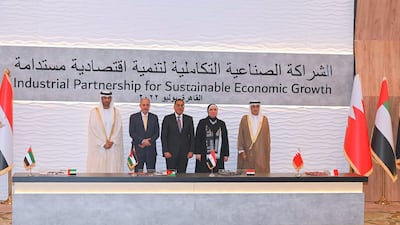The UAE, Jordan, Egypt and Bahrain will announce a “plethora” of industrial projects worth “millions of dollars” at a meeting in Amman next week.
“Some programmes involve co-operation between … all four countries,” Yousef Al Shamali, Jordan’s Minister of Industry, Trade and Supply, said at the World Government Summit in Dubai on Tuesday.
Last year, the UAE, Egypt and Jordan formed the Industrial Partnership for Sustainable Economic Development to boost sustainable growth while exploring opportunities for joint investments in priority sectors.
Bahrain, a major producer of raw aluminium and iron ore, joined the partnership in July.
A $10 billion investment fund has been set up and is being managed by Abu Dhabi holding company ADQ to accelerate work on the partnership across five priority sectors, including petrochemicals, agriculture and metals, Dr Sultan Al Jaber, Minister of Industry and Advanced Technology, and Cop28 President-designate, said last year.
“We managed to assess 100-plus projects in such a short period of time,” Omar Al Suwaidi, undersecretary at the ministry, said during the session on Tuesday.
“Several countries have expressed their interest to join the partnership. Hopefully, this will become a reality in Amman.”
The partnership is considered vital to bolster Arab economic integration.
It aims to establish large joint industrial projects, create job opportunities, contribute to increasing economic output, diversify the economies of the partner countries, support industrial production and increase exports.
The bloc of four nations has a combined population of 122 million, accounting for 27 per cent of the Mena region and 49 per cent of its youth aged under 24.
The industrial partnership is also expected to boost the gross domestic product of member countries by $809 billion, officials said last year.
In 2019, the UAE, Egypt, Jordan and Bahrain accounted for 30 per cent of the Mena region’s industrial contribution to gross domestic product, or $65 billion worth of industrial exports.
The Mena region is expected to grow by 3.2 per cent this year, after expanding by 5.4 per cent in 2021, according to the International Monetary Fund.
Trade activity within the region is still “low”, with consumer goods representing a large part of the flow, Mr Al Shamali said.
He called on other nations in the region to join the partnership to ensure economic “complementarity” among Arab countries and to avoid direct competition.
Mr Al Suwaidi said trade initiatives need to also look at the localisation of “value chains”, in addition to supply chains.
“We also focused on adding sustainability to these [priority] sectors.”
The UAE, the Arab world’s second-largest economy, aims to expand the industrial base under its Operation 300bn programme.
Launched in March 2021, the 10-year strategy seeks to increase the industrial sector's contribution to the country's GDP to Dh300 billion ($81.7 billion) by 2031.
Gulf economies are performing well due to the “relentless” pursuit of reforms and not just because of high oil and gas prices, IMF managing director Kristalina Georgieva said on Monday.













































